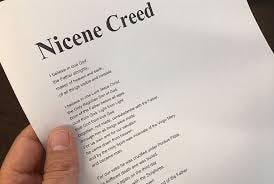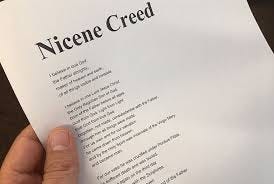A few weeks back I had the pleasure of talking about the Nicene Creed in Hobart to a group of seminary students and church-goers.
One thing that has struck me about the Nicene Creed is that it is partly the result of a particular debate at a particular time in church history about the nature of God and Jesus.
Yet, at the same time, there is something universal about the Nicene Creed since it is the creed that all Christian traditions, including Protestant, Catholic, Orthodox, and Oriental Orthodox, affirm. This universal consent is arguably based upon how the Nicene Creed summarizes the main tenets of the faith, its testimony to the identity of the triune God, and how we relate to God as those who constitute the church.
In other words, the Nicene Creed is the New Covenant story in nuce, the story of God’s being, God’s grace towards us in his Son, how we enter into that story by faith, the story that explains why we worship, and how we relate to others as members of the one, holy, catholic, and apostolic church.
In the Sacramental Life, David deSilva offers this reflection in the Nicene Creed:
"When we were baptized, we became part of the larger story of a community of faith, a story passed on in summary form in the Nicene Creed. This creed gives us our foundational storyline, which in turn gives us our identity, our sense of direction and our orientation to the world - if we allow it! Like the confession of sin, the creed uses we forms. It is an affirmation of our commitment to a story that we received from a community of faith that has struggled to live in line with this story across the millennia. Ours is not a private faith, nor is the story one that we are free to alter to suit our liking. Indeed, the Nicene Creed exists largely as a result of the church's working out the nonnegotiable contours of the story of God's interventions in God's world in response to some independent thinkers - who would come to be known as "heretics" - whose innovations were viewed as unhelpful tampering with that story. The early church leaders who wrestled with the formulation of the creed did so not only out of a desire to get the story and the characters straight. They also did so out of a knowledge that the story we tell about God is the starting point for living out our lives before him and in line with him."
The Nicene Creed is not antiquated dogma that we recite blindly by rote every Sunday.
The Nicene Creed is testimony, faith, and story!





Well said, Mike... I feel anchored by the creeds and often find them really helpful when engaging with other faith communities.